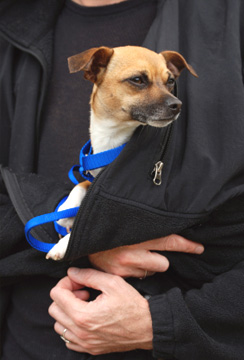|
 It’s every pet parents worst nightmare. And, according to reliable sources, it’s a crime that’s on the rise. It’s every pet parents worst nightmare. And, according to reliable sources, it’s a crime that’s on the rise.
According to the American Kennel Club, the number of pet kids reported stolen is rising. In fact, the selling of abducted companion animals has become so common that a new phrase has been coined: pet-kidnapping.
Whether you realize it or not, there is a black market for pets. Dogs in particular are assessed in these underground circles according to their “street value”, the going price if sold illicitly. Puppies, purebreds and dogs with unusual markings fetch the highest prices. Some thieves rob puppies from pet stores and animal shelters. Others swipe dogs left unattended outside stores or in cars. A spokesperson for the AKC said that they now receive pet-kidnapping reports nearly every day, ranging from nighttime home break-ins to broad-daylight attacks in public parks.
The abducted dogs and cats are then sold at roadside stands, flea markets or online through community-based classified forums. Recently a story was published about a Washington family being reunited with their stolen Great Dane, all because they noticed a “for sale” posting for their prized pup on a popular online classified forum for $150.
Another disturbing and emerging trend is pet theft followed by the collection of a posted reward. These criminals know that companion animals are increasingly viewed by Americans as family members, and that pet parents are eager to pay handsomely for the safe return of their beloved pet kids. In these scenarios, a dog or cat disappears, the pet parent posts reward posters, and a couple of days later … viola! The pilfered pet is returned and the thief makes off with what is essentially a ransom … without ever making a demand for payment. This isn’t true for every missing pet case, but you need to be aware of the possibility.
The pervasiveness of the internet in modern life has also made it easier to steal and sell companion animals. With so many web sites and outlets dedicated to selling pets, policing all of them is a formidable, if not unachievable task. Suffice it to say that if you’re looking to adopt or purchase a dog or cat online, if the animal is presented without papers and at half the price of similar breeds, you may be an unwitting participant in a crime by purchasing the stolen pet.
How to Avoid Buying Stolen Pets
If we could collectively avoid purchasing pet-kidnapped dogs and cats, it follows that the demand would decrease, and so too would the number of stolen pets. Here are some pointers about how to be part of the solution, not part of the problem …
When you adopt, obtain your pet from a reputable breeder, rescue organization or humane society – any organization offering proof of the pet’s origin. If at all possible, avoid buying pets from internet-only retailers, roadside stands or at flea markets. Even newspaper ads offering pets at reduced prices, ‘relocation’ fees, or for minimal “shipping fees” should be considered suspect.
If you plan to purchase a purebred puppy, first visit the home of the breeder and request to meet the birth mother. Whether you’re seeking a purebred puppy or kitten, ask for the litter registration number. If you decide to go through a pet store, ask for a detailed history of the animal’s origin, because some pet stores do business with unsafe (and often inhumane) puppy mills. Above all, use your common sense - beware of ads marred by misspellings and grammatical errors, as many illegal pet scams originate overseas.
On the flipside, if you have a newborn litter of puppies or kittens, or find yourself in a situation where you must surrender a pet, please utilize the services of a reputable rescue organization to ensure the safety of these animals. Whatever you do, don’t post an ad in your local newspaper with the phrase “free to good home”. I know of many pets who were “adopted” through these ads only to end up as laboratory animals, or as bait in illegal dog fighting rings.
Protect your Companion Animal from Pet-Kidnappers
Reading this article is the first step, so good job!
At all times, practice caution and prudence. When walking your dog, always keep him or her on a lead. If strangers approach your pet, avoid sharing information about your pet’s bloodlines, how much you paid to adopt or how much training they’ve had.
Keep in mind that unattended companion animals make easy marks for pet-kidnappers. Avoid leaving your dog alone in the backyard for large periods of time, especially if your yard is fully visible from the street. If you must leave your dog outside, equip gate entries with alarms, or at least padlocks (optimally located inside the gate to deter the use of bolt-cutters). As I mentioned earlier, don’t leave your pet kid tied up outside a store or alone in your car (especially if it’s unlocked).
If you believe your companion animal has been stolen, talk to everyone you can find in the vicinity where your pet went missing. This includes mail carriers, gas company employees, meter readers, security guards and delivery persons … anyone who might have seen - or could be on the lookout for - your pet kid.
Create a “lost” flyer using an up-to-date photo of your pet kid and a brief description of your pet kid’s identifying features and health issues (the latter will help to diminish the perceived “street value”). Post them throughout your neighborhood. Distribute them to local shelters, veterinarians and pet stores. Consider posting the information on Craigslist and other online message boards, especially those associated with your pet kid’s breed. Make posts on missing-pet web sites, such as dogdetective.com and k9alert.com. Take a stack of your flyers and visit local dog walker associations, agility centers, breeders and any dog park associations … you’ll be utilizing their members’ eyes and ears throughout the community. Be sure to visit local shelters in person for at least the first ten days after your companion animal’s disappearance.
Go to the police department and file a report. Be sure to give them a copy of your flyer.
Above all don’t give up! The more energy you devote to the search, the better your chances are for reuniting with your pet kid.
The next time a friend, neighbor, co-worker or even an acquaintance asks you for help in locating a lost or stolen dog or cat, share the preceding tips with them … and offer to help distribute their flyers. Working together, we can fight the rising tide of these crimes.
Thank you for all you do to make the world a better place for companion animals!
 Dr. Jane Bicks Dr. Jane Bicks
|